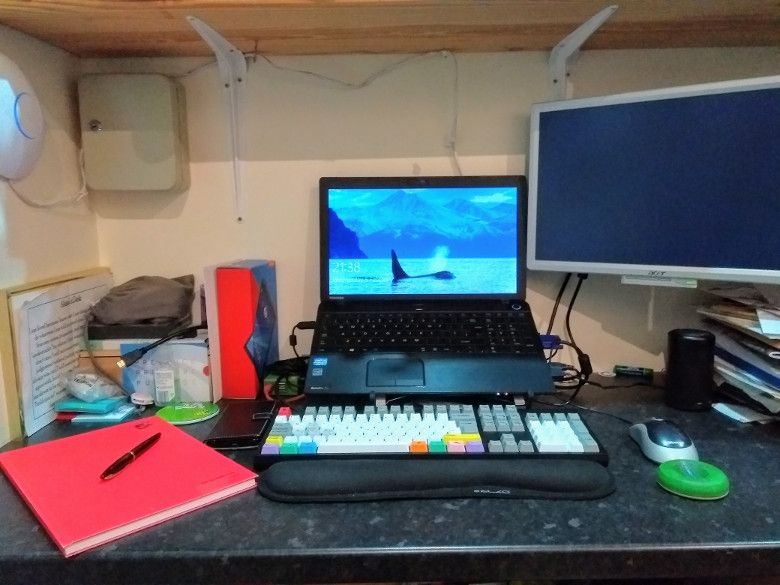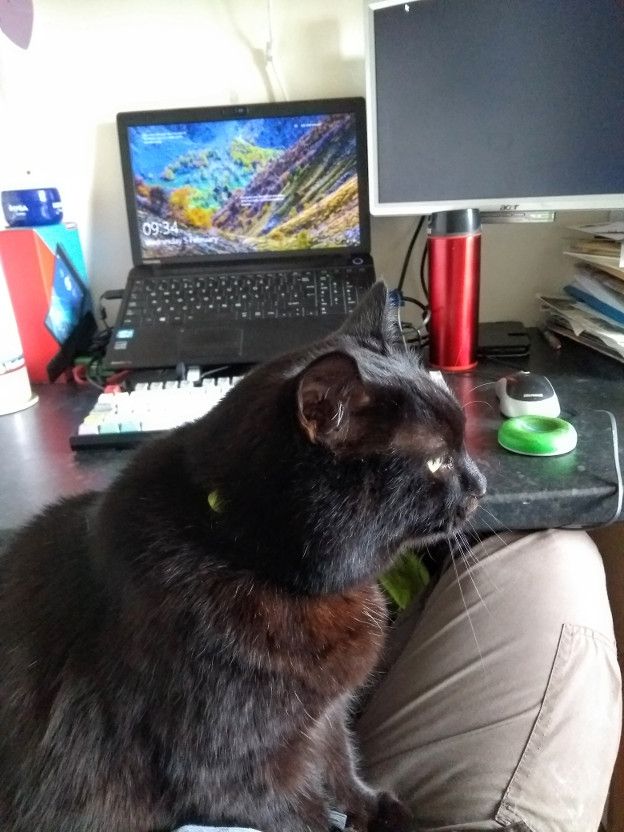Reflections on working from home
I've been working from home more recently, and I reflect on this here.

In my new role I'm no longer responsible for hardware (beyond looking after my devices), so it's unlikely I'll be called on[1] to look at a faulty switch, run some cables or replace a failed device. With this reduced need to be on-site comes the increased opportunity to work from home. In this post I'll talk about my experience so far.
I don't work from home very often, preferring a clear work / home divide, but sometimes it can be very convenient. Previously I'd only worked from home if I had an appointment near to home, was expecting a delivery (like my keyboard) or was studying. Primarily I still only work from home when I need to really concentrate and, at the moment at least, I think that's likely to continue. There's an office move planned for the future and some rumours suggest there'll only be one desk for every three people (cutting the costs of staff accommodation), so home working is something I've had to consider.
Others in the home
First off there's an impact to others in the home. In my case, my wife also works from home as a remote teacher. She runs GCSE and A-Level maths and science courses for students on a number of different continents and that means she needs relative quiet in order to not bombard her students with background noise. It's a sad fact that we can't work in the same room as each other, recording aside, as I tap (apparently) and she talks maths problems through to herself, so one of us has to move out of the study.
Similarly, when my daughter gets home from school I'm still working, so have to be left alone. She's pretty good at that, but isn't necessarily the quietest, especially with a friend round, and the additional noise can have an impact.
Mixed signals
As a (hopefully) amusing anecdote, my daughter came to see me as I worked from home and made a "T" symbol with her hands. I interpreted that as "would you like a cup of tea?" and assumed my wife had sent my daughter to ask me as I was on the phone. My daughter then passed me a note asking if we could play Terraria, so I wrote back explaining I was working so we couldn't play right now. I finished my call, my wife came upstairs - no tea in hand - and was confused when I asked where the tea had got to.
My daughter had meant "T for Terraria", but promptly got educated in how to make a cuppa!

Saved travel time == more hours on the clock
The commute to my nearest office is about 12 minutes by bike (8 when the schools aren't in), which is very reasonable if you ask me. When working from other offices (something I only tend to do for meetings) my commute can increase to about 50 minutes, dependant on traffic. When working from home my commute is a couple of minutes - the amount of time it takes my rather poor work Toshiba Satellite c50 to boot into Windows 10, and connect to the Virtual Private Network (VPN).
With everything set up at home I can eat breakfast and start working, or eat breakfast while working (a much more enjoyable way to read emails!). By "arriving" at work so quickly I can clock on earlier, resulting in more hours on the clock. We operate a flexi-time system so any time I do over my 37 hours a week can be banked and used as necessary for appointments, lunch with my family and the like.
The downside is that I end up banking this time, rather than using the time to do other things (household chores, writing blog posts, reading...), essentially "moving" the time from one point to another[2].
Dedicated work space
A dedicated work space would be really handy as I could maintain that separation between my professional and personal lives. Unfortunately I don't have a spare room I can dedicate to my employer, so I work from the second desk in my study. This desk is very much an ad hoc arrangement, and sometimes has to be cleared before I can start working:

With the exception of the laptop, all the electronic equipment in the photograph is mine, either spares or my regular devices moved over. This isn't the end of the world, as I don't work from here primarily, but I would expect my employer to provide a better second monitor if I was based at home permanently. Research has shown that multiple monitors increase productivity. (I did read somewhere that adding a third monitor doesn't increase productivity further.)
From reading other people's blog posts I know employers vary hugely in their approach to home workers and the hardware that's provided. I'm not complaining about my employer's approach here (home working isn't my default), and I don't know what is provided to home workers. I know everyone's expected to conduct a display screen equipment assessment for health and safety - my setup wouldn't quite pass.
Not having a dedicated work space leads not only to the mixed signals problem I mentioned earlier, but also feline invasion:

Social isolation & keeping in touch
My other reason for preferring office life is the social side of work. Don't get me wrong, I'm there to do a job, not chat all day, but water cooler conversations can be really useful. Also useful are the comments you pick up being in the office. Comments made between other colleagues, sometimes off the cuff, can save hours of work. It was one such comment that allowed me to determine that a ransomware attack was in progress.
Without instant messaging tools it would be very easy to go for days without "talking" to someone, and I don't think that's good for you. I have a number of chats going at work, some social and some purely work related, and these really help me to feel included in office life on the days I'm at home. Video calling can also be useful, as can an old fashioned telephone call, but I still feel the need to actually see people in person.
It's very hard to join your colleagues at the café for lunch if you're not in the same place too.
Reduced exercise
My typical work day involves a bike ride to the office, potentially a walk at lunch and then a bike ride home. As part of my day I tend to walk to speak to colleagues (why always use instant messenger all the time when we're in the same building?) and sometimes have meetings with people in other buildings. When working from home I miss that element of exercise, and my Fitbit stats confirm that - if I don't go to the office (or on the days I drive) I rarely make 10,000 steps a day.
When the weather is good I try to make a point of going for a walk into the village at lunch time. A loop takes about 15 minutes and at least gets me some exercise for the day. If I moved to working from home permanently I'd need to be very disciplined, building a 15 - 20 minute bike ride into the morning and evening to keep my fitness levels up. Even then I'm unlikely to go for a ride if it's absolutely pouring with rain, whereas when I have to go to my office to work I'm committed to that ride.
Financial costs
Depending on your mode of transport, working from home will either save you money or cost you money. In my case, my cycle to work is largely free (I have the bike anyway) as I don't have to fill it with petrol, so working from home costs me more than it saves. While working from home I have to heat the house, power my work devices, provide an Internet connection (something I'd have anyway, but any usage limits would be impacted) and any rubbish I make has a capacity cost to my family bin. I've not analysed what the actual financial cost of this is, but it wouldn't surprise me if this amounted to a hundred pounds a year (or more) if I worked from home every day.
Conversely, if I drove to work (further afield) every day I could be spending £45 a week on fuel, so there would be a huge saving. If I was commuting to London every day then I'd be spending £7,000 a year on travel. There are clear cost savings to working from home in those scenarios.
Conclusion
Full time home working isn't for me at the moment, I think I'd miss the social aspects too much. That said, I think employers should be encouraging working from home as an option, as some people I know much prefer the "home office" arrangement. The number of cars I see on my ride to work, each with a single person in them, would be reduced if more people worked from home - a large benefit to the environment and to road congestion.
Banner image: Cropped photograph of my setup
[1] In reality I'm still very happy to help out my old team, and converse with them daily, but the business is less likely to expect me to undertake that work.
[2] Hopefully that sentence makes sense, it made sense in my head!

